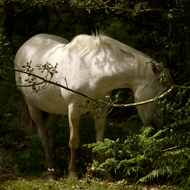Horse owners that are concerned about EGS have been advised to seek advice from their vet.
Outbreak thought to be caused by unusual weather
Equine grass sickness (EGS) has been confirmed as the cause of death in two horses in Guernsey by the state's veterinary officer, David Chamberlain.
Mr Chamberlain says this is the first confirmed outbreak of acute EGS in the Bailiwick of Guernsey.
The disease was confirmed by laboratory analysis at the Animal health Trust.
A pony was also affected but has made a recovery. However, Mr Chamberlain says given the nature of EGS, the prognosis is guarded.
EGS is a debilitating and often fatal disease that affects grazing horses, ponies and donkeys. No specific treatment or vaccines are currently available.
It is not known what causes EGS but evidence increasingly suggests it may be the result of infection involving Clostridium botulinum type C.
Mr Chamberlain says the cause of the outbreak in Guernsey is uncertain but may be the result of unusual weather this winter, triggering rapid grass growth and increase in the levels of causative bacteria in the horse's gut.
A normal inhabitant of the intestines of animals and humans, Clostridium botulinum is widely found in the outdoor environment, particularly soil.
EGS is thought to occur when Clostridium botulinum is ingested from the environment, in conjunction with other risk factors.
Clinical signs include abdominal pain, difficulty eating, increased heart rate, increase in saliva in the mouth and involuntary muscle twitching and weakness.
Horse owners with concerns about EGS have been advised to seek advice from their veterinary surgeon.
When disease is confirmed, owners are advised to remove any remaining horses from the field in which disease occurred.
Mr Chamberlain says that as EGS is not a notifiable disease, no information is available about any suspected cases. Confirmation of the disease is not possible before death, as current tests are based on examination of tissues at post-mortem.







 Birmingham Dogs Home has issued an urgent winter appeal as it faces more challenges over the Christmas period.
Birmingham Dogs Home has issued an urgent winter appeal as it faces more challenges over the Christmas period.
